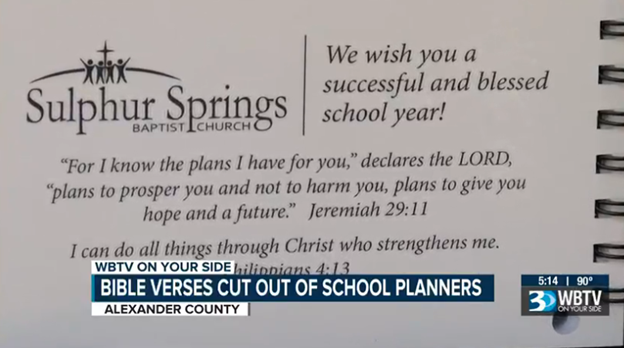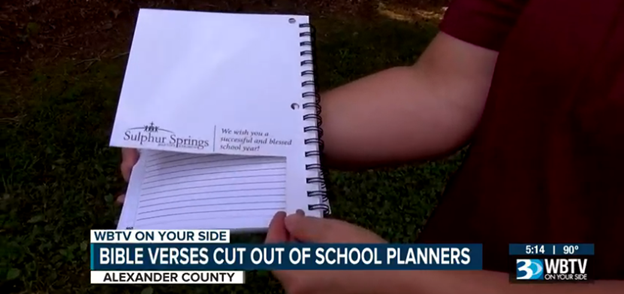
By Hunter Hines
Christian Action League
September 17, 2020
Sulphur Springs Baptist Church, located in Alexander County, wanted to do something for East Alexander Middle School. So after conversing with the School’s principal, Kristie Love, the church’s Pastor of Youth and Children, James Safrit, set out to provide student planners for the kids.
The church spent more than $2000 for the planners, which featured two Bible verses on the back cover. The verses were from the Old and New Testaments:
“‘For I know the plans I have for you,’ declares the LORD, ‘plans to prosper you and not to harm you, plans to give you hope and a future’” (Jer. 29:11).
“I can do all things through Christ who strengthens me” (Phil. 4:13).

But the school responded to the magnanimous gift by cutting out a portion of the back covers to remove the Bible verses. The school district argued that it had no choice because of the “separation of church and state.”
Safrit told the Christian Post that when the church decided “to put Bible verses on the back cover of the planners,” he didn’t think it would be problematic. “It wasn’t a mandatory gift for every kid. It was just provided if they wanted it,” Safrit said.
Various news media have reported that many parents were upset at what the school did. Still, the school system doubled down in a statement to the press, which said, “It is an individual student’s right to share their beliefs – religious or otherwise, but not the public school’s role to indoctrinate them with any religious teachings.”
Rev. Mark Creech, executive director of the Christian Action League, said both parties had a point, Alexander County Schools and the parents who were upset.
“I think parents are rightly disgusted over the way faith is scrubbed from the public schools today. To think our nation’s founders thought education should be completely secular, that religion, more specifically the Christian religion, shouldn’t be part of the classroom or student life is far removed from our history,” said Creech. “Some of them thought and stated that if Christianity wasn’t a part of our children’s education, we would only be making educated pagans out of them.”

Creech added that, on the other hand, several erroneous Supreme Court decisions through the years had had a chilling effect on the place of faith in public schools.
“The High Court has ruled there are some things which can be done and some things that can’t. And the ignorance and bigotry of school officials about what is allowed and what isn’t can be astonishing. And then there are the ways that groups such as The Freedom From Religion Foundation and The American Civil Liberties Union have intimidated school systems with threats of lawsuits,” he said.
In its news story about the student planners, the Christian Post listed four cases where schools had faced legal challenges over religious displays:
“In 2014, a school in West Virginia painted over a Bible verse that was displayed on the walls of its gymnasium after receiving a complaint letter threatening a potential lawsuit from the Wisconsin-based FFRF.
“In 2017, an Indiana school district secretary was forced to remove a Bible citation from her email signature after FFRF sent a complaint letter demanding its removal.
“Earlier that year, A New Mexico public school painted over a mural that featured an inspirational verse from ‘Hebrews 6:19” after a demand letter from FFRF.
“In 2012, a Rhode Island high school was forced to remove a prayer banner after a student at the school filed a joint complaint with the American Civil Liberties Union. The banner was later replaced by a secular mural.”
“These kinds of actions by atheist activist groups scare schools into suppressing expressions of faith, which is what they intend to do. But Christians shouldn’t give up. There is an end-run the High Court has left open,” said Creech.
He continued:
“As long as what’s done is student-initiated, there is absolutely nothing the school system can do to stop it! They cannot require that literature (or planners with Bible verses on them) has to first be reviewed and approved by school officials. They cannot require the materials distributed to be placed in a designated location. The way the Courts have ruled, it’s only the teachers and school staff’s involvement with literature distribution that poses a problem, largely because it may give the impression that the school is endorsing a religious view, and, therefore, violating the Establishment Clause of the Constitution. However, students do not have the same restrictions imposed by the Establishment Clause. Students cannot establish a religion; only government entities and their agents can establish a religion. So students have all the affirmative protection of the Free Exercise Clause of the First Amendment.”
Creech said that he had spoken with Safrit at Sulphur Springs Baptist Church and told him the key is to equip the students for sharing the planners or other religious material for distribution. “I realize churches prefer keeping the peace. Besides, as Christians, we are peacemakers. However, peace at any price isn’t peace,” said Creech. “What we don’t use, what we don’t defend, we tend to lose. Religious liberty is God-given right and worth fighting for. I think it’s important that when churches run into roadblocks like this that they try it again – go at it from another angle. Student-initiated actions are the key! It’s the open door for getting the Gospel and its positive message of hope into the public schools. The student body desperately needs that message.”
